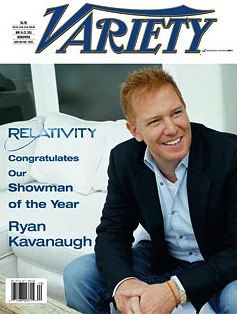

By Ray Pride Pride@moviecitynews.com
The FT On Ryan Kavanaugh
 The Financial Times’ Matthew Garrahan writes up a compelling read on the rise and rise of Relativity Media’s Ryan Kavanaugh (FT free access for limited number of articles monthly): “At just 36, the redheaded Kavanaugh has already produced more than 30 movies. He has raised billions… from Wall Street firms, money which has been invested in more than 100 films released by Hollywood studios,” Garrahan introduces, including snips from Kavanaugh’ press, such as when Variety “declared that Kavanaugh ‘eschews sleep, clocking a mere 90 minutes to two hours a night,’ and revealed, among other things, that when not producing movies he spends his time ‘working with sick kids in hospitals,’ practicing ‘transcendental meditation’ and ‘closing in on a cure for cancer’ through his involvement with a bio-tech venture.” Garrahan sifts through the origins and history of Relativity even as Kavanaugh refuses an interview. “Kavanaugh was new to the party and spoke openly about how he was going to fix a broken entertainment industry that he claimed wasted too much money. This made him as many enemies as friends… Does he have what it takes to stay in the game as one of Hollywood’s most influential players? … He doesn’t dress like a movie mogul and usually wears jeans, Converse trainers and a shirt with a black tie askew. His grandparents were Holocaust survivors… A number-cruncher adept at structuring complex financial deals, perhaps his biggest talent is his charm, with few in Hollywood rivaling his skill as a salesman. He has earned notoriety in the business for his lavish spending: at one dinner at the Ago restaurant… Kavanaugh left a $20,000 tip, according to someone who claimed they saw the credit card receipt. Relativity would not comment on the terms of Kavanaugh’s remuneration package but the company’s growth has given him access to perks enjoyed by other studio heads such as use of a corporate jet…” The VF-style detail entertains, but it’s the narrative of the company’s fortunes that makes it a must-read. “Hollywood is watching closely, keen to see if renewed Wall Street interest in owning entertainment companies is real or, like so much else in Hollywood, a carefully crafted mirage. But Kavanaugh has worked in the movie business long enough now to know that a good film has to have a compelling third act.” [The history at the link.]
The Financial Times’ Matthew Garrahan writes up a compelling read on the rise and rise of Relativity Media’s Ryan Kavanaugh (FT free access for limited number of articles monthly): “At just 36, the redheaded Kavanaugh has already produced more than 30 movies. He has raised billions… from Wall Street firms, money which has been invested in more than 100 films released by Hollywood studios,” Garrahan introduces, including snips from Kavanaugh’ press, such as when Variety “declared that Kavanaugh ‘eschews sleep, clocking a mere 90 minutes to two hours a night,’ and revealed, among other things, that when not producing movies he spends his time ‘working with sick kids in hospitals,’ practicing ‘transcendental meditation’ and ‘closing in on a cure for cancer’ through his involvement with a bio-tech venture.” Garrahan sifts through the origins and history of Relativity even as Kavanaugh refuses an interview. “Kavanaugh was new to the party and spoke openly about how he was going to fix a broken entertainment industry that he claimed wasted too much money. This made him as many enemies as friends… Does he have what it takes to stay in the game as one of Hollywood’s most influential players? … He doesn’t dress like a movie mogul and usually wears jeans, Converse trainers and a shirt with a black tie askew. His grandparents were Holocaust survivors… A number-cruncher adept at structuring complex financial deals, perhaps his biggest talent is his charm, with few in Hollywood rivaling his skill as a salesman. He has earned notoriety in the business for his lavish spending: at one dinner at the Ago restaurant… Kavanaugh left a $20,000 tip, according to someone who claimed they saw the credit card receipt. Relativity would not comment on the terms of Kavanaugh’s remuneration package but the company’s growth has given him access to perks enjoyed by other studio heads such as use of a corporate jet…” The VF-style detail entertains, but it’s the narrative of the company’s fortunes that makes it a must-read. “Hollywood is watching closely, keen to see if renewed Wall Street interest in owning entertainment companies is real or, like so much else in Hollywood, a carefully crafted mirage. But Kavanaugh has worked in the movie business long enough now to know that a good film has to have a compelling third act.” [The history at the link.]














